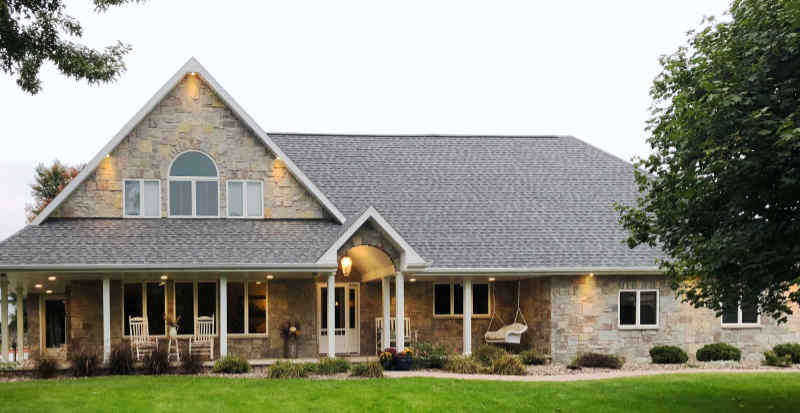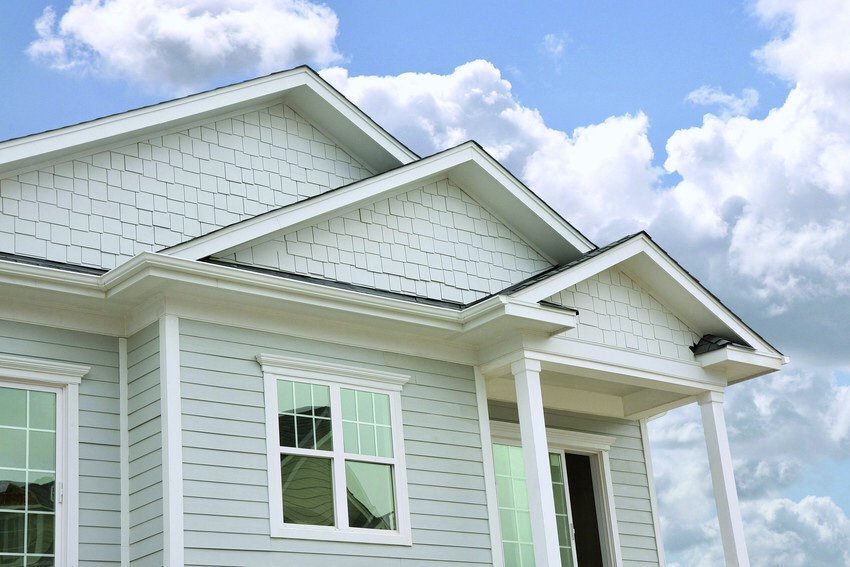
The cost to replace vinyl siding will vary depending on the size and shape your home as well as what type of material you choose. Siding is not inexpensive, but it can also add value to your home. If you decide to install siding, you will need to pay for materials, labor and disposal costs. Materials costs can vary depending on how big your home is. Expect to pay between $3 and $15 per square foot. If you hire a contractor to do the job, the cost will go up.
The cost of vinyl siding installation is anywhere from $5,355 to $16,090. The type of siding, layout of gables, windows and finish will all impact the price. There will be a variation in the labor costs. Permit fees will also have to be paid. This will vary from state to state, but generally you can get a permit for $100 to $250.
Although vinyl siding can be installed by you, it's best to leave the job to professionals. It can be complicated and you may get hurt. It is possible to hire a professional to make sure that the job goes smoothly. It is worth taking the time to get estimates from several contractors.

Vinyl siding replacement costs include all materials, equipment, and labor. The cost of replacing your vinyl siding will depend on how big and what type of home you have. It is common to need at least two estimates.
Your total cost will depend on the size of your house, the style of the siding you choose, the number of windows, the number of stories, and the complexity of the job. Sometimes, only a small portion of your home will need to be replaced. For a home measuring 2,500 square feet, you can expect to spend between $6900 and $28,000. Vinyl siding can be more expensive if you live in colder climates.
If you want to paint the siding, you will need to purchase acrylic-based paint and adhesive primer. It is essential that you trim all of your boards and trim before you start the painting process. To remove caulk and nails around your window and door openings, you'll need to first clean them. Next, clean the surface and dry it before you start painting.
A typical home measuring 2,500 square feet will have a larger kitchen, living room, dining room and up to four bedrooms. It will normally have two to three bathrooms.

It is important to get rid of all trim and old boards before you paint siding. You will save time and avoid the need for repairs later.
FAQ
Is it more expensive to remodel an existing house than to build one new?
There are two options if your goal is to build a new home. One option is to buy a pre-built home. This type of home is already built and ready to move in to. You can also build your own home. This option will require you to hire a builder in order to design and build your dream house.
Cost of building a home is determined by how much time you spend planning and designing it. Custom homes may take more work as you'll need to complete most of it yourself. But you can choose the materials you want and where you want them to be placed. It might be simpler to find a contractor specializing in building custom homes.
A new home is typically more expensive than one that has been renovated. You'll have to pay more for land and any improvements. Additionally, permits and inspections will be required. The average price difference between a new home and one that has been renovated is between $10,000 and $20,000.
How Much Does It Cost to Renovate A House
The type of material, the project size and the complexity of renovations will all impact the cost. Certain materials, such as wood, require special tools like drills and saws. Others like steel don't. The price of renovations depends on whether you hire a contractor to do the job or if you are willing to do the work yourself.
The average home improvement project cost is between $1,000 and $10,000. If you plan to hire professionals, the total cost would range from $5,000 to $25,000. You could also spend as much as $100,000 if you do it all yourself.
You should know that there are many factors which determine the final cost of renovation. The type of material used (e.g. You can choose between brick or concrete, and the size of your project as well. These factors must be taken into consideration when estimating the cost of renovation.
How do you choose a good contractor to work with?
Ask friends and family for recommendations when selecting a contractor. Also, look at online reviews. You should ensure that the contractor you select has experience in the field of construction you are interested. Request references and make sure to verify them.
What should I do first in a house renovation?
Clean out your home and get rid of all clutter. You will need to clean out all moldy areas and repair any leaky pipes. Finally, you'll need to repaint the interior. Final steps include cleaning up exterior surfaces and applying new paint.
Which room should I renovate first?
The heart and soul of any home is the kitchen. It is where you spend your most time cooking, entertaining, eating, and relaxing. It's where you will find the best ways to make your home more functional and beautiful.
The bathroom is also an important part of any home. It provides comfort and privacy while you take care of everyday tasks, such as bathing, brushing teeth, shaving, and getting ready for bed. If you want to improve the functionality and appearance of these rooms, consider adding storage space, installing a shower instead of a tub, and replacing old fixtures with modern ones.
Are you able to live in a renovated house?
Yes, I am able to live in a house and renovate it.
Are you able to live in your house while the renovations are ongoing? The answer depends on how long the construction work takes. If the renovation takes less time than two months, then no, you can still live in your home during construction. If the renovation takes longer than two weeks, however, you can't live in your home during the construction.
Because of the possibility of falling objects, you shouldn't live in your home while a major construction project is underway. The heavy machinery and noise pollution at the job site can also cause dust and noise pollution.
This is especially true if you live in a multi-story house. The vibrations and sounds that construction workers create can cause damage to your property and contents.
You'll also need to cope with the inconvenience of living in temporary housing while your house is being renovated. This means you won’t have the same amenities as your own home.
As an example, your washer and dryer will be out of commission while they are being repaired. In addition to the unpleasant smells of chemicals and paint fumes, you will have to endure the noises made by workers.
All these factors can lead to stress and anxiety among you and your family members. You should plan ahead to avoid feeling overwhelmed by this situation.
Do your research before you begin renovating your home. You can avoid costly mistakes later.
Also, it is a good idea to get professional help from a reputable contractor in order for everything to go smoothly.
Statistics
- A final payment of, say, 5% to 10% will be due when the space is livable and usable (your contract probably will say "substantial completion"). (kiplinger.com)
- It is advisable, however, to have a contingency of 10–20 per cent to allow for the unexpected expenses that can arise when renovating older homes. (realhomes.com)
- Rather, allot 10% to 15% for a contingency fund to pay for unexpected construction issues. (kiplinger.com)
- Design-builders may ask for a down payment of up to 25% or 33% of the job cost, says the NARI. (kiplinger.com)
- They'll usually lend up to 90% of your home's "as-completed" value, but no more than $424,100 in most locales or $636,150 in high-cost areas. (kiplinger.com)
External Links
How To
Where can I find information regarding home improvements?
Home improvement projects are an excellent way to save money while improving your home. You can make your home attractive without spending a lot. You can paint, landscape, or add a hot tub to your home. Many resources are available online that will assist you in deciding which project you should undertake.
The internet offers a wealth information about home renovation projects. Many websites offer detailed instructions for how to accomplish various tasks. These websites often include pictures of completed projects to help you visualize what your home would look like after each task is finished.
Articles on topics related to home improvements may also be written by professionals. A magazine article might tell you which paint is best for your walls. This article might give you ideas on how to choose colors and paint types that match your existing decor.
There are also websites that specialize in providing advice and recommendations regarding home improvement. Websites such as Houzz.com, Pinterest.com, and Yelp.com are great places to learn about home improvement projects. Each website has useful information about the products and services you may be interested in.
Some websites only focus on home improvements. Lowe's.com, for example, allows you to view the company's entire catalog of tools and other materials that are used in home improvements. Information on how to install and choose window treatments may also be available.
Home improvement projects are fun, exciting, and rewarding. It is possible to make your house more attractive by learning about them.